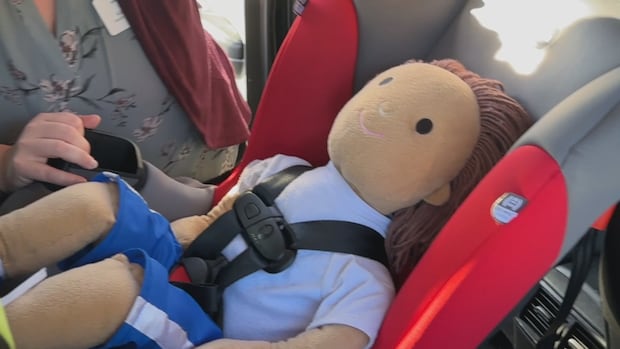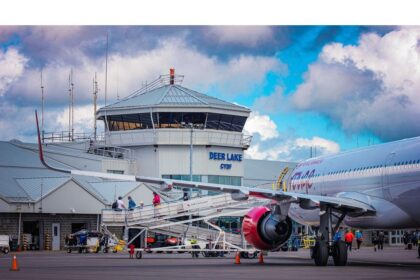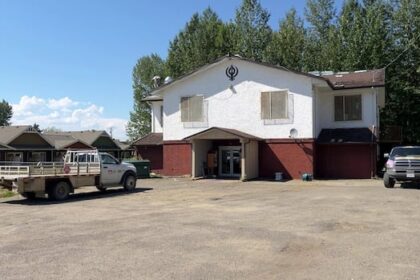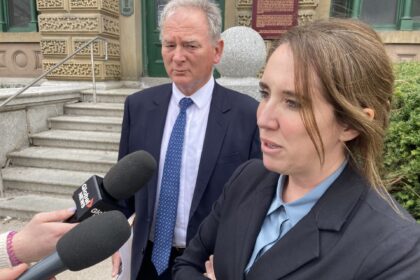Nova ScotiaA team from Dalhousie University and the IWK’s Child Safety Link conducted a series of roadside checks in 33 communities in Nova Scotia during the past year. It found 84 per cent of the car seats it checked were either being used incorrectly or had been improperly installed.’When it comes to children’s safety, we want to make sure we educate the parents,’ says RCMP officerPreston Mulligan · CBC News · Posted: Sep 24, 2025 5:00 AM EDT | Last Updated: 3 hours agoOne common mistake researchers found was seatbelts and restraints that were too loose. (Preston Mulligan/CBC)Staff at the IWK Health Centre are sounding the alarm about the number of parents in Nova Scotia who are securing their children in car seats incorrectly.A team from Dalhousie University and the IWK’s Child Safety Link conducted a series of roadside checks in 33 communities during the past year. In total, 1,005 child passengers from infants up to 14 years old were checked in almost 700 cars to determine how they were being restrained.”We just wanted to see how are the kids doing, how are they buckled,” said Katherine Hutka with Child Safety Link. “You can’t choose the day that you’re going to have a collision. And so it’s important to make sure their child is securely buckled up on every ride.”The team discovered that 84 per cent of the car seats it checked were carrying children whose seats had either been improperly installed or were being used incorrectly.It also found six per cent of children secured in a booster seat did not meet the minimum 18-kilogram weight requirement and 37 per cent of children wearing seatbelts did not safely fit without a booster seat. Three per cent of the child passengers were not restrained at all.In 2012, the last time a roadside study was carried out, researchers found 73 per cent of car seats were used or installed incorrectly.Many children riding in cars without proper restraintsAccording to data collected by Child Safety Link, an average of 65 children ages 14 and under die each year in Canada in motor vehicle crashes. Hutka said correct use of a car seat or booster seat reduces the risk of children suffering injury or death by 71 per cent.While she pointed out researchers gathering data have gotten better at spotting violations, she said it’s still distressing to see so many children riding in cars without proper restraints.”We do have a growing, different population now than we had 10 years ago,” Hutka said. “Car seats are a little bit more complex as well. There’s been innovation. And so with innovation comes diversification where car seats work very differently. And so that may have been a contributing factor.”The study recommended greater outreach in communities with identified barriers such as language or culture that might impede proper use of restraints.”And so we were also looking into whether or not families who had only been here a few years from countries that don’t have seatbelt or car seat laws, whether they had a greater risk of misuse,” Hutka said.She also noted as an example that there is no requirement in Nova Scotia for taxis to provide car seats or booster seats for children, suggesting that could send a mixed message to some adult drivers with children.”And so a lot of parents and caregivers are getting the message that it’s safe to put a child on your lap unrestrained in a vehicle,” Hutka said.’Some people just don’t know’RCMP in Nova Scotia are unlikely to issue tickets for incorrect car seat or booster seat usage.”I think when it comes to children’s safety, we want to make sure we educate the parents and ensure that they know what they need to do to make sure that their children are riding safely,” said Const. Mandy Edwards of Halifax RCMP. “So at first it’s always education. Some people just don’t know.”ABOUT THE AUTHORPreston Mulligan has been a reporter in the Maritimes for more than 20 years. Along with his reporting gig, he also hosts CBC Radio’s Sunday phone-in show, Maritime Connection.
High percentage of children’s car seats being used incorrectly in Nova Scotia: IWK











